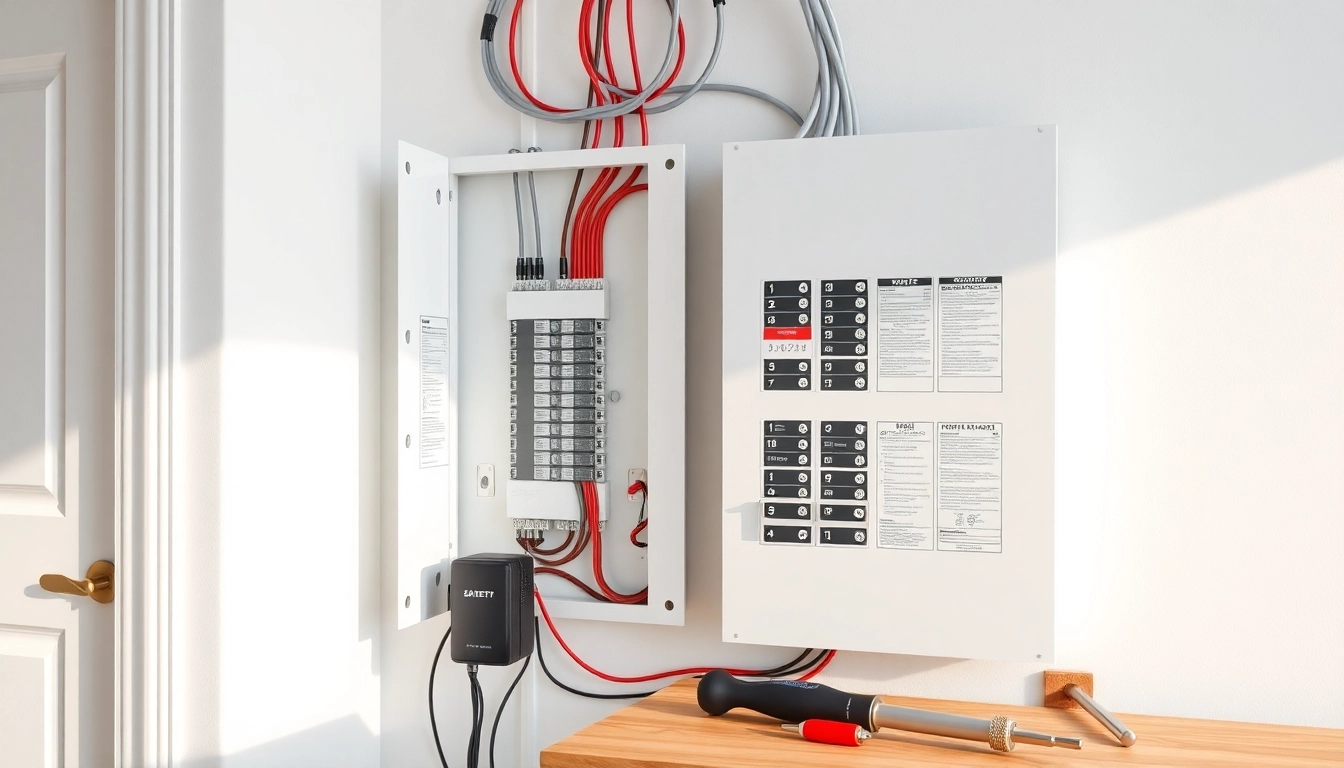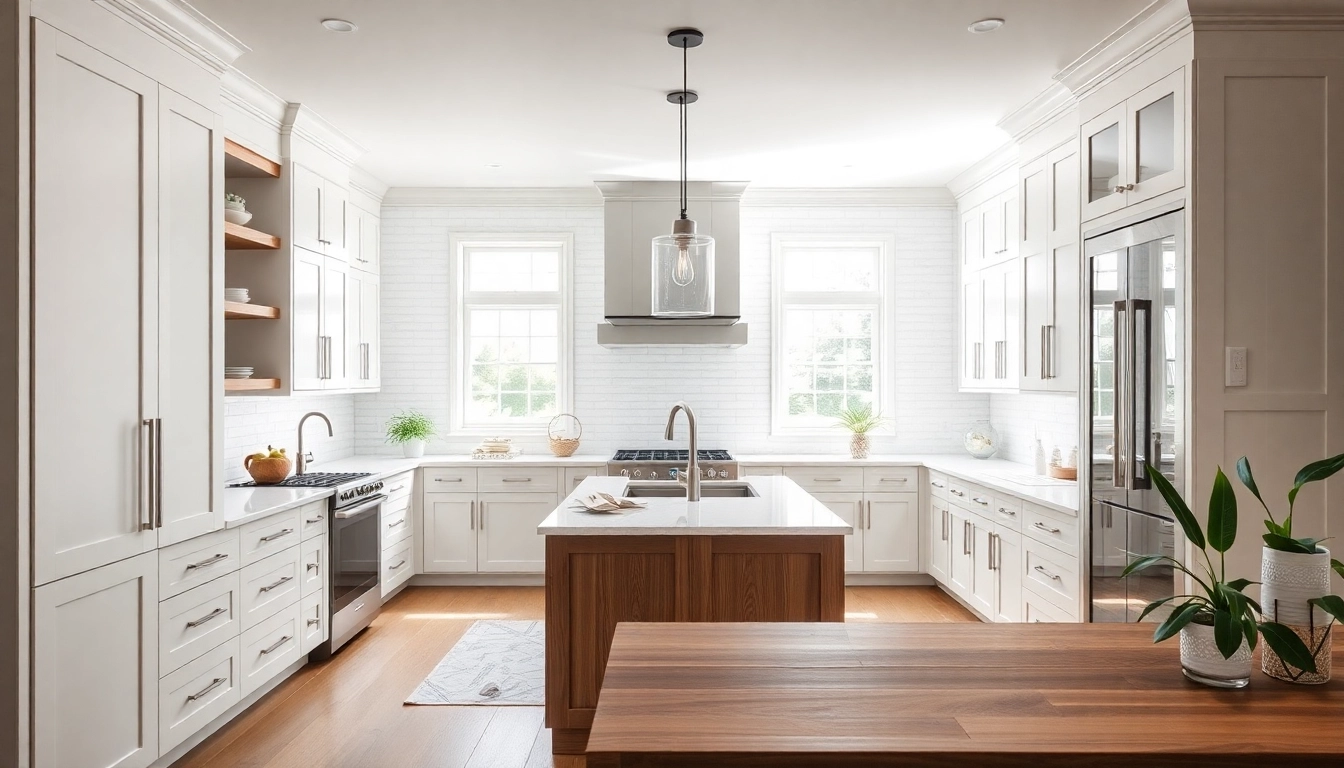
Understanding Electrical Panels
What is an Electrical Panel?
An electrical panel, commonly referred to as a breaker box or fuse box, is a crucial component of any electrical system. Serving as the central hub for the distribution of electricity throughout a home, it connects the incoming electrical supply from utility companies to the various circuits that power everything from lighting to appliances. This essential device not only controls the flow of electricity but also enhances safety through circuit breakers that prevent overload and potential fires. To grasp the significance of an electrical panel, one must consider its role in managing electrical loads and providing protection against electrical faults.
Key Components of the Electrical Panel
Understanding the individual components within an electrical panel is integral to recognizing its functionality and safety features. Here are the essential parts:
- Main Breaker: This is the large switch that controls the power to the entire panel. It allows you to disconnect power to all circuits in the event of an emergency.
- Circuit Breakers: These smaller switches protect individual circuits from overload or short circuits. Each breaker can trip independently to safeguard specific sections of your electrical system.
- Bus Bars: Conductive bars, usually made of copper or aluminum, distribute electricity from the main breaker to the various circuit breakers.
- Ground and Neutral Bars: These bars connect the ground and neutral wires of your home’s electrical system, providing a safe route for electrical faults.
- Meter Socket: This component connects the panel to the electric meter, which measures electricity usage for billing purposes.
How Electrical Panels Function
The operation of an electrical panel is straightforward yet vital to the overall safety and efficiency of a home’s electrical system. When electricity from the utility company arrives, it first passes through the main breaker, which can be toggled off during emergencies or maintenance. From there, the electricity flows to the bus bars, where it is distributed to each circuit breaker according to the required load. Each breaker can be manually or automatically tripped if electrical flow exceeds safe levels, thus preventing damage and risks associated with overloads or shorts.
Signs You Need to Upgrade Your Electrical Panel
Common Indicators of Panel Overload
Identifying when to upgrade your electrical panel is crucial for maintaining safety and efficiency in your home. A few clear signs indicate potential overload:
- Frequent Tripped Breakers: If circuit breakers frequently trip, it suggests that your panel cannot handle the electrical demands of your home.
- Flickering Lights: Lights that flicker or dim when you turn on appliances can imply that the electrical panel is overloaded.
- Burning Smell: Any unusual burning smells near the panel indicate overheating or potential electrical fires and should be addressed immediately.
Age and Compliance Issues
Electrical panels typically have a lifespan of about 20-30 years. Panels older than this range may not comply with modern electrical codes and safety standards. In addition, outdated equipment may not support the electrical load required for contemporary appliances and technology, leading to increased risks and inefficiencies.
Safety Risks Associated with Outdated Panels
An obsolete electrical panel can present significant safety hazards, such as:
- Fire Hazards: Older panels may not have the necessary protection against overloads, raising the risk of electrical fires.
- Electrical Shock: Deteriorating panels can lead to exposed wires, increasing the odds of shock.
In this context, upgrading to a modern electrical panel is not just an improvement but a necessity for ensuring the safety of your property and inhabitants.
Choosing the Right Electrical Panel
Types of Electrical Panels: Pros and Cons
When considering a new electrical panel, it’s essential to evaluate the various types available:
- Main Breaker Panel: Controls all circuit breakers and is ideal for most homes. Pros include ease of distribution and built-in safety features. Cons may involve limitations in scalability for larger homes.
- Subpanel: Supports additional circuits in larger homes or when major renovations occur. Pros include enhanced capacity but can be more complex to install.
- Transfer Panel: Ideal for homes utilizing generators, allowing easy switching between main and generator power. However, its cost and complexity may be a downside for some homeowners.
Understanding Amp Ratings and Their Importance
A critical factor in selecting an electrical panel is its amp rating, which indicates the maximum amount of electricity it can handle without tripping. Standard ratings for residential panels typically range from 100 to 200 amps:
- 100 Amps: Suitable for smaller homes with minimal electrical needs.
- 200 Amps: The industry standard for average to larger homes, accommodating typical modern electrical demands.
Choosing the right amp rating ensures that your panel can sufficiently meet your home’s electricity requirements, especially as newer appliances demand more power.
Recommended Brands and Models
When selecting an electrical panel, various brands offer reliable options. Notable ones include:
- Square D: Known for high quality and excellent performance, the Square D QO series is often rated highly by professionals.
- Eaton: Offers diverse and innovative solutions, with the Eaton Cutler-Hammer line being popular for both residential and commercial applications.
- GE: A reputable brand with a strong record for dependability and performance in home electrical systems.
Installation Process for an Electrical Panel
DIY vs Professional Installation
While some homeowners might consider a DIY approach for installing an electrical panel, it is vital to gauge the risks involved. Electrical work poses significant hazards; hence, consulting a licensed electrician is often the best course. Professionals can ensure compliance with local codes and regulations, improving safety and efficacy.
Permits and Local Regulations
Upgrading or installing a new electrical panel usually requires permits from local authorities. These regulations ensure that installations adhere to localized building codes and safety standards. Homeowners should contact their municipal office or consult their electrician to understand the necessary permits and procedures involved.
Cost Breakdown of Electrical Panel Installation
The cost associated with installing a new electrical panel can vary significantly based on panel type, amp capacity, and labor costs. A general cost overview includes:
- Panel Cost: Between $250 to $450 based on specifications.
- Installation Labor: Typically ranges from $300 to $800, depending on complexity and local rates.
- Permitting Fees: Can vary by locality, averaging from $50 to $200.
Overall, homeowners should budget roughly $600 to $1500 for a complete panel upgrade, which includes all costs associated with materials and labor.
Maintenance and Care for Electrical Panels
Routine Checks and Balancing Loads
Regular maintenance is crucial for ensuring the longevity and reliability of your electrical panel. Recommended maintenance strategies include:
- Regular Inspections: Engage a licensed electrician for regular inspections to check for wear, corrosion, or any signs of damage.
- Load Balancing: Ensuring that electrical loads are evenly distributed across all circuits maximizes efficiency and minimizes risks of overloads.
Signs of Problems and Troubleshooting Tips
Being able to identify issues early can prevent costly repairs. Watch for these common signs:
- Warm/Hot Panels: If the panel feels warm to the touch, consult an electrician immediately.
- Burning Odors: If you detect strange smells, it can indicate severe electrical issues requiring immediate attention.
- Buzzing Noises: Unusual sounds can signify that a circuit breaker needs attention or replacement.
Best Practices for Long-Lasting Performance
To ensure your electrical panel performs optimally throughout its lifespan, consider the following best practices:
- Keep the panel clean and free from obstructions.
- Periodically test circuit breakers by flipping each one to maintain their functionality.
- Document any changes or repairs for future reference.
In summary, an effective electrical panel is vital for any home’s electrical framework. From recognizing when an upgrade is necessary to selecting the right type and ensuring proper installation and maintenance, taking these steps will enhance your home’s safety and efficiency. For a deeper understanding of electrical panels, including when to upgrade, refer to this comprehensive guide on Electrical Panel considerations that can help you make informed decisions.







